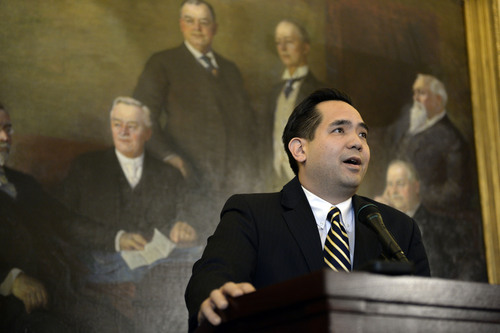This is an archived article that was published on sltrib.com in 2014, and information in the article may be outdated. It is provided only for personal research purposes and may not be reprinted.
Employees in the Utah attorney general's office were warned this week that, under a revised office policy, they could be fired for talking to news reporters without permission.
The clampdown comes as recently installed Attorney General Sean Reyes tries to plug leaks and rebuild morale in an office devastated by a yearlong scandal involving his predecessor, John Swallow.
The memo, issued Monday to attorneys and staff at the attorney general's office, states that all contact with news media "must be directed through the Communications office of the Utah Attorney General."
"All communications with media, or those claiming to be media, concerning the Attorney General's Office including policies, personnel, cases or any other UAG business that take place outside of this system are subject to immediate disciplinary actions up to and including termination," the revised policy states.
Word of the anti-leak policy was leaked Tuesday to The Salt Lake Tribune.
Randy Dryer, a prominent Utah media lawyer, said there are competing interests in any government office, particularly one, like the attorney general's, that is recovering from a scandal.
"The new attorney general wants to demonstrate to the public that things are different, that there's a new set of ethics and behavior and conduct … and the way to help convey that is to make sure there's one voice speaking on behalf of the organization," Dryer said. "On the other hand, who knows whether the unethical practices and illegal practices of the prior administration ever would have been exposed if people felt like they'd be fired if they ever spoke to anyone about it?"
—
Sharp teeth • Last week, the office's spokeswoman, Missy Larsen, sent staff a reminder to direct all media inquiries to her and noted that the wider office media policy was being reviewed.
The beefed-up guidance that followed on Monday added sharp teeth to the office's previous policy.
Before, the office policy stated that employees must coordinate communications with the press office, but also directs the public employees to be "accountable to the public."
"One of [the office's] official duties is to provide information to the public concerning the legal matters entrusted to the office," the office policy manual states. "As such, employees must be open, candid, and helpful to media representatives on issues that impact state government and Utah residents."
If reporters contact an employee, the manual says, "it is part of his or her official duties to provide such information as can be legally and ethically made public."
Larsen, communications chief for the office, said the new memo clarifies existing press policy, which is consistent with other state agencies and other law firms.
"There is no intent by our office or Attorney General Reyes to shut off media access to information about the A.G.'s office," she said in a statement. "To the contrary, it has been an emphasis by the Attorney General to make himself and the office available to the media on a consistent basis."
Larsen said the office handles hundreds of cases with sensitive information and has to balance attorney-client concerns, health information and confidential information about victims, witnesses, informants and investigators.
"In many cases, to have a loose policy would not only be unethical, but illegal."
—
Control the flow • Dryer said whether an employee could realistically be fired for speaking to reporters depends on the specific facts.
"Every organization, whether it's a private organization or government entity, has an interest in controlling the flow of information," Dryer said. "Government employees are a little different in that there are certain whistleblower protections that would apply and there may be some free-speech implications, as well."
Several other departments have written policies stating that media inquiries need to go through the department's spokespeople. The Department of Human Services policy, for example, states that employees can speak to members of the media as long as they don't purport to be representing the department and do not divulge private or protected information.
Marty Carpenter, spokesman for Gov. Gary Herbert, said departments in the state have designated spokespeople so offices can provide accurate information in a timely, uniform manner.
"It's just generally a matter of making sure the person speaking to the media has all the necessary information instead of just some of the information," Carpenter said. "As far as I know, we haven't fired or had to fire or considered dismissing someone for having gone to the media."
Salt Lake County government has agency press officers, but there isn't a written policy barring employees from talking to reporters.
"There's no policy that governs that," said Alyson Heyrend, communications director for County Mayor Ben McAdams. "There's nothing in a government manual that says you can't speak [to media] without going through the press office."
Charles Stormont, an assistant attorney general who filed this week as the Democratic candidate for attorney general, said he received the new policy directive but doesn't believe it applies to his campaign activities.
"When I'm campaigning, I'm campaigning personally and I hope everyone knows that," he said. "I'm just a citizen like anyone else. … I feel like it shouldn't have much impact on the campaign at all."



